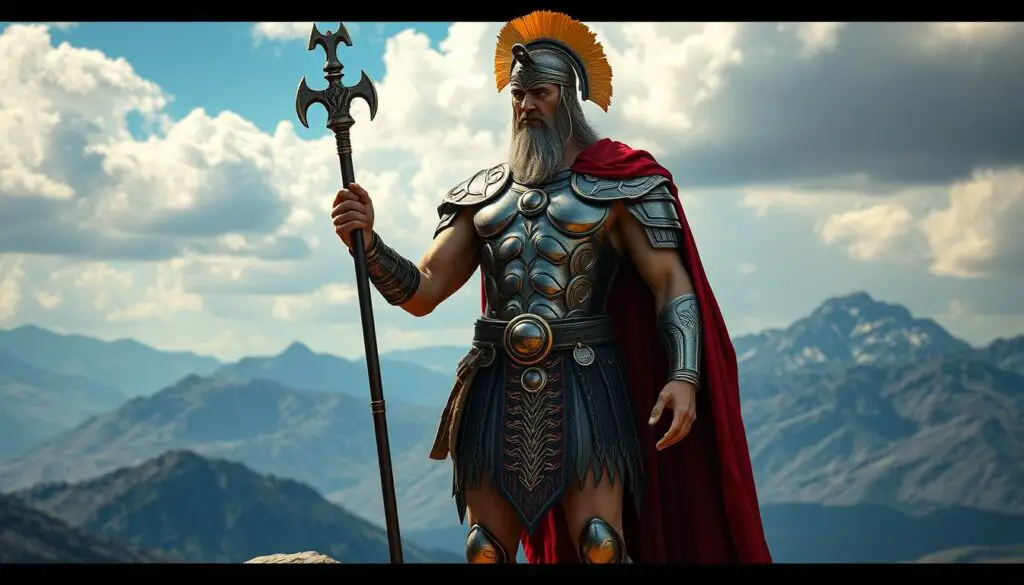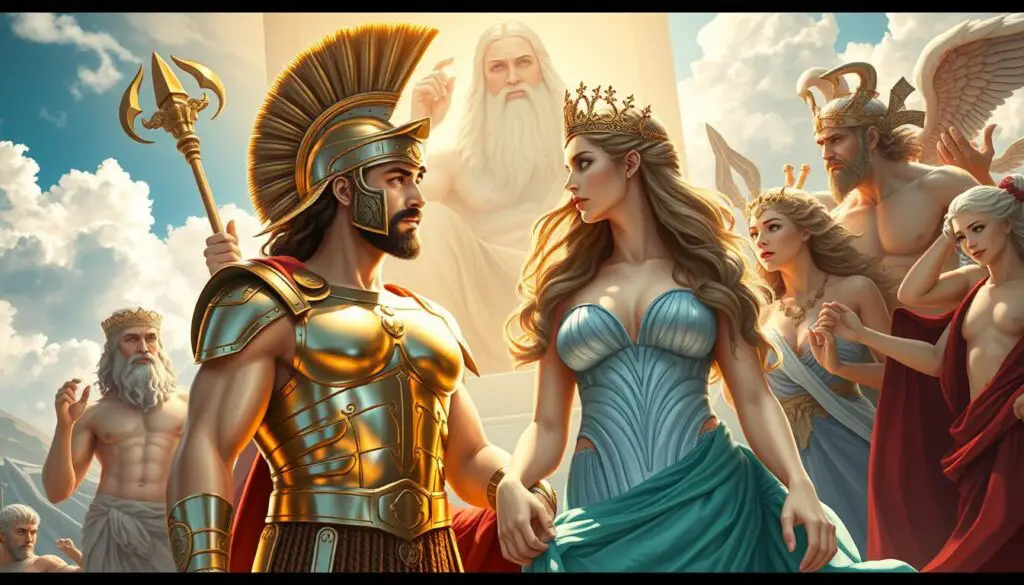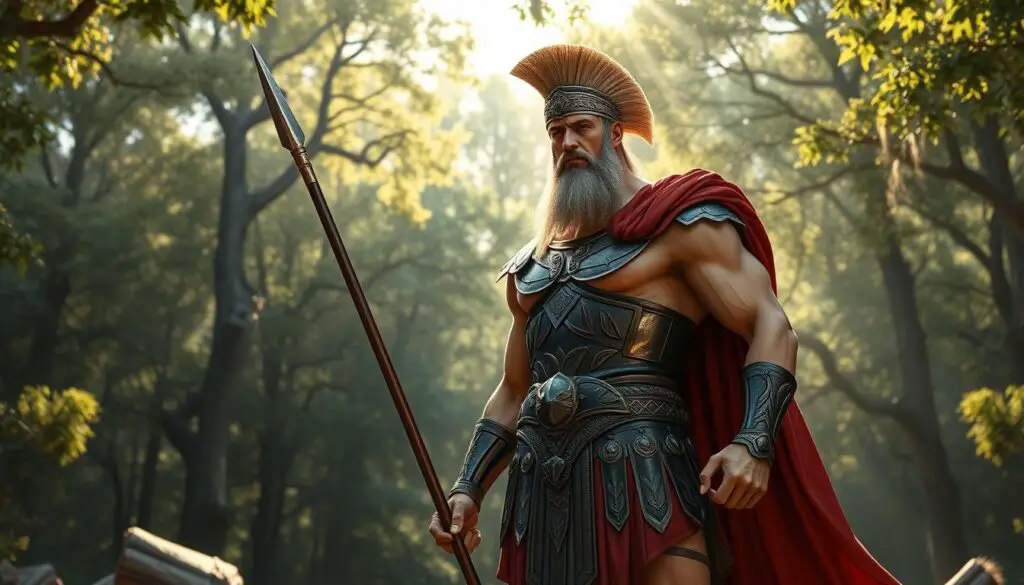In the grand tapestry of Greek mythology, few names resonate with as much impact as Peleus.
Known as the King of the Myrmidons in Thessaly and the esteemed father of the legendary Achilles, his story is rich with heroism, tragedy, and divine intervention.
While Achilles’ exploits in the Trojan War often eclipse his legacy, Peleus’s life provides a fascinating glimpse into the world of Greek myths and hero-cults.
From his early days in Phthia to his renowned marriage to the sea nymph Thetis, Peleus’s journey is marked by extraordinary events.
He was part of the legendary group of Argonauts and played essential roles in several famous mythological quests.
While he faced challenges, including exile and tragedies, his legacy endures through the epic tales that continue to captivate audiences today.
Key Takeaways
- Peleus was known as the king of Phthia and the father of Achilles, a central figure in Greek mythology.
- He married Thetis, a sea-nymph, and together they had seven sons, with only Achilles surviving infancy.
- The marriage was celebrated by the Olympian gods, who offered various gifts, including immortal horses and a knife.
- Peleus was an Argonaut and partook in significant mythological quests such as the hunt for the Calydonian Boar.
- Despite facing exile and numerous trials, Peleus’s legacy lives on through the epic tales of his son, Achilles.
Introduction to Peleus

Peleus, esteemed as a paramount Greek hero, was the son of Aeacus, King of Aegina, and Endeis.
This introduction sets the stage for delving into his intriguing life, a tale that steadfastly intertwines with the larger narrative of Greek mythology and the renowned Trojan War.
From his early beginnings, Peleus’s journey was laden with divine interactions and dramatic exiles.
Born into royalty, he was deeply affected by his father’s influence and the divine presence that frequented their lives.
Aeacus, imbued with wisdom and divine connections, deeply impacted Peleus, shaping him into a figure of significant prowess and respect.
Peleus’s life is marked by a series of remarkable events that include his marriage to Thetis, a sea nymph, with whom he fathered Achilles, destined to be greater than himself.
This union not only elevated Peleus’s status but also brought forth a dynamic narrative, culminating in Achilles’ critical role during the Trojan War.
The Trojan War, according to Greek mythology, spanned over ten tumultuous years, with Achilles taking center stage towards its conclusion.
Despite the grandeur of his status, Peleus faced numerous trials, including periods of exile and heartbreak.
His dramatic exiles, including being driven from Aegina and seeking refuge in Phthia, highlight the resilience and fortitude that characterized his life.
His marriage to Antigone, daughter of King Eurytion of Phthia, was a brief respite in his turbulent journey, further solidified by Eurytion’s forgiveness for his alleged crime.
Adding layers to his narrative were his interactions with other mythical figures.
His participation as an Argonaut and involvement in the Calydonian Boar Hunt further cemented his reputation among Greek heroes.
These endeavors brought Peleus into the circle of elite warriors, enhancing his legend and embroiling him further in the intricate tapestry of Greek mythology.
Peleus’s legacy is steeped in a bittersweet duality—marked by personal tragedies and monumental contributions to Greek lore.
His trajectory from a prince exiled for an unfortunate event, to gaining divine favor and fathering a hero like Achilles, underscores a life of profound impact and enduring tales.
As we journey through the chronicles of Peleus, we unveil the layers of heroism, divine interactions, and trials that shaped this unforgettable figure in Greek mythology.
Early Life of Peleus

Peleus, one of the remarkable figures in Greek mythology, had a dynamic early life filled with complex family ties.
His birth and upbringing took place on the island of Aegina, where he was the son of Aeacus and Endeis.
Growing up, Peleus was surrounded by familial tension, particularly with his brother Telamon and their half-brother Phocus.
Birth and Family
From the outset, Peleus’s life was intertwined with profound relationships. His father Aeacus, renowned as a wise king, and his mother Endeis, ensured Peleus was well-rooted in Aegina.
His bond with Telamon was crucial, yet complex. The atmosphere was conducive to an inevitable rivalry, particularly with Phocus, who was favored by Aeacus for his athletic prowess and exceptional skills, setting the stage for familial discord.
The Death of Phocus
A tragic turning point in Peleus’s life was the untimely death of his half-brother Phocus, an episode shrouded in mystery and speculation.
Whether Phocus’s death was an accidental consequence or a deliberate act spurred by jealousy is a matter of intense debate in Greek mythology.
This event precipitated Peleus’s exile from Aegina, pushing him to a path of redemption and profound transformation. His journey post-exile eventually led him towards remarkable achievements, but the shadow of Phocus’s death always loomed over his legacy, compelling him to seek absolution.
Peleus’s storied life, beginning on the island of Aegina and enduringly influenced by the rivalry with Telamon and the tragic loss of Phocus, laid the foundation for his future as a mythical hero.
His subsequent endeavors, including participation in the Calydonian Boar Hunt and his famed wedding to Thetis on Mount Pelion, only solidified his repute in the rich tapestry of Greek mythology.
Peleus in Exile

Peleus, once a prince of Thessaly, found himself engulfed in turbulent times.
Forced into exile after the accidental killing of his half-brother Phocus, Peleus embarked on a transformative journey that would ultimately lead him to Phthia.
It was here, under the realm of his uncle, King Eurytion, that Peleus sought purification and refuge.
Journey to Phthia
In Phthia, Peleus’s arrival marked a significant chapter in his life’s tale, deeply entwining his destiny with the region’s history.
King Eurytion, empathetic to Peleus’s plight, welcomed him warmly and granted the sought-after purification.
This act of kindness not only absolved Peleus of his past but also allowed him to start anew in this land of legendary warriors and myths.
The bonds solidified in Phthia would go on to form the bedrock of Peleus’s legacy, referenced often in tales forming the intricate tapestry of the Greek saga.
Marriage to Antigone
Strengthening his integration into Phthian society, Peleus married Antigone, the daughter of King Eurytion.
This marriage upended the roots of his exile and firmly tied his fate to this new homeland.
Antigone brought with her not just a portion of King Eurytion’s kingdom, but also the promise of unity and strength.
Through this union with Antigone, Peleus cemented his role as a pivotal figure in Phthia, now ruling a third of the kingdom and commanding the Myrmidons, the warrior people whom legends say were created by Zeus from ants.
Together, Peleus and Antigone contributed to the rich fabric of Greek legend by founding a lineage that would one day bear Achilles.
The story of Peleus in exile culminates with his return to prominence, highlighted by his pious adherence to the customs of purification rites under King Eurytion.
This saga not only underscores the profound impact of Peleus’s journey but also enriches the broader narrative of Greek mythology.
Peleus as an Argonaut

Peleus firmly established his place in legend as one of the renowned Argonauts, the illustrious band of heroes who sailed with Jason in search of the fabled Golden Fleece.
His role in this epic journey remains a vital chapter in the broader narrative of Greek mythology, exhibiting not only his bravery but also his astuteness and strategic counsel.
Chosen astutely by Jason, Peleus brought invaluable insights and heroics to the expedition, showcasing his strength and intellect amidst the myriad challenges they faced.
This quest for the Golden Fleece was a monumental undertaking in Greek epic literature, highlighting the collective might and individual valor of the Argonauts.
Throughout the perilous voyage, Peleus’s contributions were indispensable, from navigating treacherous waters to confronting mythical creatures.
His actions alongside the Argonauts underscore his legacy as a pivotal figure in this Greek epic, embodying the essence of heroism that defines these ancient tales.
The Calydonian Boar Hunt

The legendary tale of the Calydonian Boar Hunt is one of the great heroic adventures in Greek mythology.
Sent by Artemis to punish King Oeneus for neglecting her in his offerings, the boar wreaked havoc upon the region of Calydon, leading to a call for heroes across Greece to rid the land of this monstrous beast.
Participation in the Hunt
Peleus, the renowned hero, joined forces with legendary figures like Atalanta, Meleager, and Theseus, marking his place among the pantheon of Greek myths.
The Calydonian Boar, known for its massive size and strength, caused extensive damage, uprooting tall trees and destroying orchards. Atalanta, a fierce huntress raised by Artemis, was the first to wound the boar, while Meleager ultimately delivered the fatal blow.
Meleager’s decision to award the boar’s hide to Atalanta sparked a deadly conflict, leading to the deaths of his uncles and ultimately his demise, exacerbated by a curse from his mother, Althaia.
Peleus’ involvement in the hunt not only showcased his bravery but also placed him at the center of these tragic events, which remain a key part of his legend.
Absolution in Iolcus
Following the hunt, Peleus sought absolution for the accidental death of Eurytion, his father-in-law, during the hunt. He returned to Iolcus, where King Acastus, showing compassion and understanding, absolved him of his guilt.
This act of mercy by Acastus foreshadowed future tumultuous events, underscoring the complex web of relationships in Greek tales.
The Calydonian Boar Hunt, celebrated in classical art and literature, shines a light on the intricate interplay of heroism, tragedy, and divine intervention in Greek myths.
Peleus’ participation solidified his status as a hero, while the contributions of figures like Atalanta and Meleager further enriched this iconic tale.
Peleus and Thetis

The relationship between Peleus and Thetis stands as one of the most enchanting tales within the Greek pantheon.
The story of their union highlights the significant intersection between mortal lives and divine interventions.
Thetis, a renowned Nereid and leader of the fifty Nereides, was admired by both Zeus and Poseidon.
However, fearing a prophecy that her son would be mightier than his father, both gods refrained from pursuing her.
The distinctive marriage of Peleus and Thetis began with Peleus’ unconventional courtship.
Contrary to typical wooing methods, Peleus had to physically restrain Thetis, who demonstrated her shape-shifting abilities by transforming into various entities to evade him.
This act of perseverance and cunning eventually won Thetis over.
Pelion, being the venue for their wedding, invited the entire Greek pantheon, although not without drama. The wedding, which took place on Mount Pelion, saw many divine gifts, including the immortal horses Balius and Xanthus.
These horses would later belong to their son, Achilles.
The ceremony had a notable absence – Eris, the goddess of discord, was not invited. Her resulting resentment led to the Judgement of Paris and, ultimately, the Trojan War. Paris’ choice of Aphrodite in exchange for Helen set off this significant chain of events.
The union of Peleus and Thetis did not only affect the gods but also the mortal realm.
As the story goes, Prometheus was freed by Zeus after revealing that Thetis would bear a son greater than his father to avoid further divine distress.
This prophecy underscored the significant influence and cosmic capacity of Thetis within the framework of both mortals and gods.
Consequently, Thetis’ marriage to Peleus bore profound implications not just for their immediate family but for Greek history as a whole.
Their son, Achilles, would go on to become one of the greatest heroes of the Trojan War, further cementing the extraordinary legacy of his parents.
The Wedding of Peleus and Thetis

The wedding of Peleus and Thetis was a grand affair, orchestrated by none other than Zeus.
In an effort to avoid a prophecy that foretold a son born of Thetis would become mightier than Zeus himself, he arranged the union.
This ceremony was attended by a host of Olympian gods, ensuring it was an event of divine magnificence.
Divine Gifts and Attendees
The grand celebration was marked by the numerous wedding gifts bestowed by the Olympian gods.
These gifts not only honored the couple but also held symbolic meanings that hinted at future events. Among the gifts was a famous spear forged by Hephaestus and a pair of immortal horses.
However, the most infamous uninvited guest was Eris, the goddess of strife, whose spiteful act sparked the beginning of significant historical events.
In retaliation for not being invited, Eris threw the Apple of Discord into the celebrations, inscribed with the words “For the fairest.”
This led to a quarrel among the goddesses Hera, Athena, and Aphrodite, ultimately leading to the Trojan War.
Not only did this act tie the hands of fate tighter around the newlyweds, but it also set the stage for calamities that would strike their offspring, most notably Achilles.
The joyous assembly at the wedding included an impressive procession of gods and goddesses, depicted in historical artifacts.
Notable figures included King Peleus, Iris, Hestia, Demeter, Chariclo, Leto, Dionysus, Hebe, Chiron, Themis, three Nymphs, and many others.
With such grandeur and mythic presence, it is no wonder that this wedding is remembered through the ages both for its splendor and its tragic foreshadowings.
The Birth of Achilles
Achilles immortalized as one of the greatest Greek heroes, was born to Thetis, a sea nymph, and Peleus, king of Phthia.
His birth marked the beginning of a saga that would see him become the fiercest warrior of the Trojan War.
Determined to make her son invulnerable, Thetis took extraordinary measures that inadvertently forged Achilles’ tragic fate.
Attempt to Render Achilles Invulnerable
In a bid to protect her son from mortal harm, Thetis dipped Achilles into the River Styx, known for its mystical properties.
Holding him by his heel, she succeeded in making him invulnerable almost entirely, leaving only his heel susceptible to injury.
This act, born of maternal instinct, created a legendary vulnerability that would later be synonymous with a fatal flaw.
The term “Achilles’ heel” continues to epitomize a critical weakness despite otherwise formidable strength.
Achilles’ Upbringing
Recognizing the importance of proper training for his son, Peleus entrusted Achilles to the wise centaur Chiron.
Under Chiron’s tutelage, Achilles honed skills that set him apart from other Greek heroes. Raised alongside Patroclus in Phthia, Achilles grew into a paragon of strength and martial prowess.
Chiron’s guidance not only shaped Achilles’ physical abilities but also instilled in him the virtues and knowledge necessary for his future exploits in the Trojan War.
Frequently Asked Questions
Q: What was Peleus famous for?
Peleus was famous for being a hero of the Achaean army in Greek mythology, his marriage to the sea-nymph Thetis, and being the father of Achilles.
Q: What did Peleus do to Achilles?
Peleus played a key role in ensuring that Achilles received the training from the centaur Chiron, preparing him to become one of the greatest Greek heroes of the Trojan War.
Q: Is Peleus a god or mortal?
Peleus is a mortal. He was the king of the Myrmidons in Greek mythology.
Q: How is Peleus related to Zeus?
Peleus is related to Zeus through his son Achilles, who is a demigod. Achilles’ mother, Thetis, a sea-nymph, was desired by Zeus, but due to a prophecy, she was married off to Peleus instead.
Q: Did Peleus marry a goddess?
Yes, Peleus married Thetis, who is considered a goddess of the sea or a sea-nymph in Greek mythology.
Q: What happened to Peleus?
After the Trojan War and the death of Achilles, Peleus’ fate varies in different stories. In some, he was expelled by his son Neoptolemus and went to the island of Cos. In others, he reunited with Thetis and lived with her in the sea.
Q: Did Peleus and Thetis love each other?
Their marriage was arranged by Zeus, but there are indications in mythological texts suggesting affection and mutual respect at certain points in their relationship.
Q: Is Achilles the son of Peleus?
Yes, Achilles is the son of Peleus and Thetis, making him a hero with a divine mother and a mortal father.




